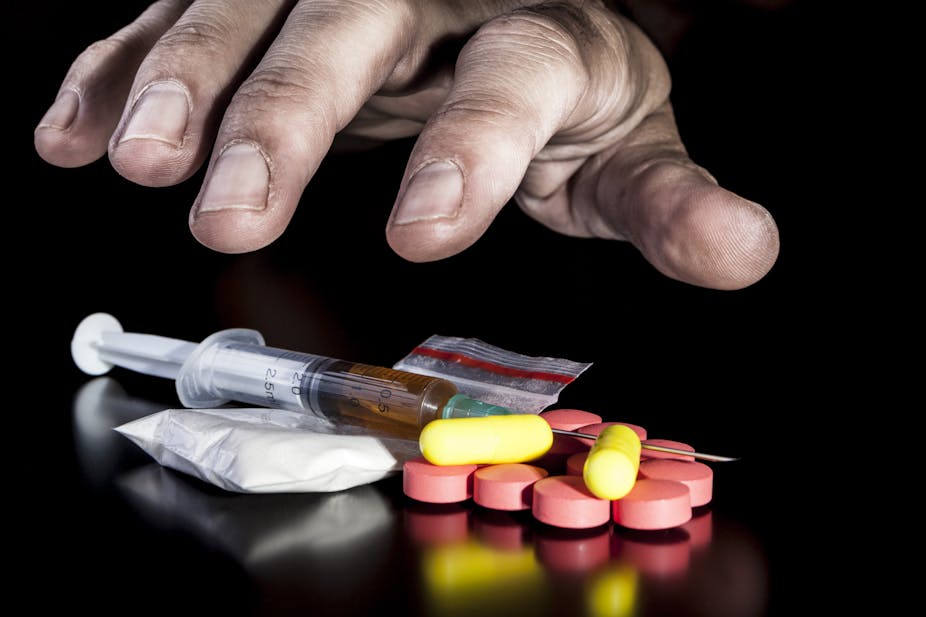Who cares what happens to drug addicts? Perhaps we all should. As well as social problems including family breakdown, homelessness and unemployment, drug use is linked to crime costing the state and individuals an estimated £13.3bn a year in the UK. Because we are citizens and taxpayers, drugs impact us all.
There is a strong public perception that treating drug addicts is about providing rehabilitation that will “sort them out”. Around 200,000 people are currently in drug treatment in England. And yet, unlike other areas of health care, drug treatment lacks a convincing body of evidence to guide services, policy makers and most importantly the individuals seeking help.
Despite several large scale trials investigating the effectiveness of drug treatment interventions, there is little evidence that any of these interventions make a big difference in the real world. Several factors have contributed to this situation. Funding is limited and patients are hard to retain in trials and have complex interrelated problems. Also, academic journals have a bias towards publishing positive results and we need to know what doesn’t work as well as what does. The impact of this lack of evidence has been to create a patchwork of services of widely varying effectiveness and suffering key problems.
Struggling services
Drug use, like fashion, is fickle. There are the old staples such as heroin and cannabis and this season’s must-haves such as so-called “legal highs”, nitrous oxide and steroids. Those responsible for commissioning or providing services just aren’t as nimble footed as these changing trends.
Most drug services remain focused on providing treatment for people who have problems with opiates such as heroin. But cannabis is now the most frequently cited drug used by those entering treatment. There is a danger that drug users believe treatment is only available for heroin, which could be putting them off accessing treatment and delaying their recovery. Or worse give the impression that it is only heroin that causes problems.
Providers of drug treatment have tried to control costs by de-professionalising their workforce, employing fewer nurses and doctors in favour of generic workers whose training and backgrounds vary. A leading addiction researcher, Colin Drummond, recently argued addiction psychiatrists were a “speciality on the brink of extinction”.

Providers of drug treatment are now in direct competition with each other as services are put out to tender and, invariably, those who can cut costs win the bid. This impedes the spread of information between providers who have no incentive to share best practice with their direct competitors.
This landscape of constantly changing providers can also create “staff churn”, where each new provider employs staff who may have less experience in the field. All of this can potentially leave clients facing constantly changing services and staff at a point in their life when they need consistency.
The government has also attempted to introduce a payment-by-results system in which providers are paid depending on how many people they treat who then become drug free. But there’s little evidence this kind of system works. A recent study showed that compared to traditional treatment, clients in payment by result (PBR) pilots were actually more likely to opt out of treatment.
We have known for decades that the majority of people who are in drug treatment have a co-existing mental health problem and that these problems are inter-related. Despite this, when new treatments for addiction are tested, people who have mental health problems are routinely excluded from trials. This may make research less complicated but limits the practical application of any positive findings.
Addiction treatment mimics this form of discrimination by excluding people who present with combined mental health and drug problems in the belief that the drug problem can’t be effectively dealt with until the persons mental health has improved. Paradoxically when mental health services receive such a referral they won’t accept the person into treatment until their drug problem is resolved. As a result, both specialities leave these people as health nomads.
Solving the problem
So what needs to happen to change all this? First, prevention is better than cure, so we need not only financial and political investment in anti-drug programmes but also reform of our non-evidence based drug laws. As it stands, the law often compounds the problems of drug users by giving them a criminal record, impeding their ability to gain employment and recover in a broader sense than just health.
For those people that require treatment for addiction, we need this to be provided and based on solid evidence. The ingredients for this include adequate investment in research, training and the workforce. To achieve parity with other areas of health such as cancer, diabetes or heart disease, a shift in public opinion is needed. All too often addiction is viewed as a self-inflicted choice rather than a problem that does not discriminate by age, gender or social status.
Historically drug treatment has had an underpinning philosophy of “come and see us when you are ready to change”. It lacks the assertive approach that has transformed mental health services over the past twenty years. I am not suggesting that drug treatment should be coercive. But the model of treatment should rely less on waiting for people to make appointments and instead seek to engage them in a much more flexible and timely way.

